Welcome back to This Week in Apps, the weekly TechCrunch series that recaps the latest in mobile OS news, mobile applications and the overall app economy.
The app industry is as hot as ever, with a record 218 billion downloads and $143 billion in global consumer spend in 2020.
Consumers last year also spent 3.5 trillion minutes using apps on Android devices alone. And in the U.S., app usage surged ahead of the time spent watching live TV. Currently, the average American watches 3.7 hours of live TV per day, but now spends four hours per day on their mobile devices.
Apps aren’t just a way to pass idle hours — they’re also a big business. In 2019, mobile-first companies had a combined $544 billion valuation, 6.5x higher than those without a mobile focus. In 2020, investors poured $73 billion in capital into mobile companies — a figure that’s up 27% year-over-year.
This week, we’re taking a look at some of the buzzier stories from the world of apps, including the latest around Parler’s attempted return to the App Store, a review of Walmart’s second livestream shopping event, and Instagram Lite’s global rollout. We also have new Clubhouse data on its total installs and its global footprint and info about Disney’s new service that could replace your MagicBand, among other things.
Top Stories
 Parler tries and fails to re-enter App Store
Parler tries and fails to re-enter App Store
The right-wing social app was booted from the App Store, Google Play and Amazon AWS following the U.S. Capitol riot, for violations of community guidelines. Apple had specifically asked Parler to change its moderation policies, which had been fairly hands-off prior to its removal from the App Store. Though Apple has a number of rules about what apps can and cannot do, Parler’s own policies were guided by the First Amendment’s approach to free speech — basically, users could say almost anything without consequence.
According to documents obtained by Bloomberg, Parler again tried to gain entry into the App Store after the original ban, and was again denied. Following the new review, Apple reportedly told Parler’s chief policy officer on Feb. 25, there was no place for “hateful, racist, discriminatory content” on the App Store. The review had also included several offensive images, including profile pictures with swastikas and other white nationalist imagery, as well as misogynistic, homophobic and racist usernames and posts.
Parler last month had said negotiations with Apple were underway, and it expected to get back in the App Store. But with this new rejection, Parler cut its three remaining iOS developers from its team, out of a total of seven who were let go, Bloomberg reported.
The controversy around Parler is reflective of a larger conversation underway in the U.S. over tech’s responsibility to moderate the content on its platforms, as users’ posts and comments are increasingly leading to real-world violence. The U.S. government has not yet regulated these platforms, leaving decisions like this up to tech itself. Parler, in a statement, said it had added filters and human review to address threats of violence, as well as optional tools that let users filter and block certain kinds of hate speech. But this didn’t go far enough to address Apple’s claims about hate symbols and offensive speech still present on the network.
Weekly News
Platforms: Apple
Apple released important security patches across all platforms. The patches fix a vulnerability — a memory corruption bug in WebKit, the engine that powers Apple’s Safari browser. An attacker can exploit the vulnerability via a malicious web page.
E-commerce

Image Credits: Walmart
 Walmart again teamed up with TikTok to host a new livestream shopping event on Thursday night. The event, co-hosted by Gabby Morrison and Nabela Noor, focused on beauty products, offering demos and tutorials where viewers could buy the products through an integrated shopping cart. The content itself was engaging, feeling very much like the makeup tutorials and “get ready with me” vlogs users already watch across social media platforms. Gabby, who demoed all the products, was adept at balancing the more casual makeup try-on portions of the live event with the QVC-like call-to-action to actually buy the item being shown.
Walmart again teamed up with TikTok to host a new livestream shopping event on Thursday night. The event, co-hosted by Gabby Morrison and Nabela Noor, focused on beauty products, offering demos and tutorials where viewers could buy the products through an integrated shopping cart. The content itself was engaging, feeling very much like the makeup tutorials and “get ready with me” vlogs users already watch across social media platforms. Gabby, who demoed all the products, was adept at balancing the more casual makeup try-on portions of the live event with the QVC-like call-to-action to actually buy the item being shown.
At times, there were as many as 8,000+ concurrent viewers participating in the live event, we noticed during our viewing. (We joined about 20 mins. after its start). During the event, we saw high engagement in the stream’s comments, including a number of positive comments — like jokes from users who lamented they were buying everything, shout-outs from those who just added an item to their cart, or compliments directed at the hosts. But there were also some trolling remarks that should have violated TikTok’s guidelines over cyberbullying, which were not moderated out — an issue TikTok will need to address as these events grow larger and more common.
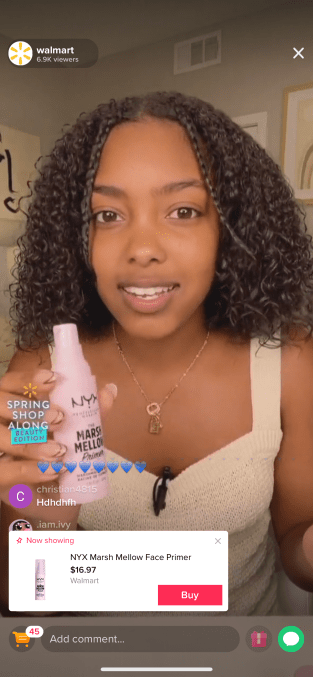
Image Credits: screenshot of Walmart’s account on TikTok
Walmart last year had run an apparel-focused live shopping holiday event — the first pilot of TikTok’s live shopping feature in the U.S. The retailer has not commented on sales from its first event, but says they hit Walmart’s projections. Walmart also said the event drove a 25% increase in TikTok follower growth, and 7x more views than anticipated.
Social
Facebook is targeting emerging markets with launch of Instagram Lite, a lightweight Android version of the app that takes up just 2MB of space. The app was made available across 170 countries this week, offering the ability to view and share photos and videos, Stories, IGTV, discover content through Explore, and more. However, the app lacks the ability to film Reels — Instagram’s TikTok rival — users can only view them.
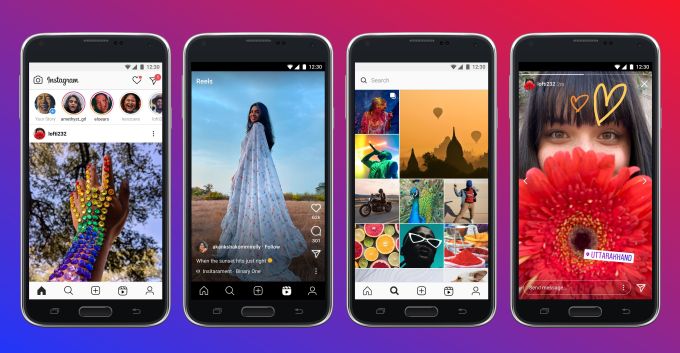
Image Credits: Facebook
The app is not Facebook’s first attempt to develop a lightweight version of Instagram. The company previously released an Progressive Web App, which was pulled in 2020. A new app was then launched in December in India in a limited test, ahead of this broader release.
 Clubhouse has now reached 12 million worldwide downloads, an increase of 600K since March 1, according to new data from App Annie. The largest market for the app is still the U.S. which accounts for 3.1 million downloads. But the app has a strong global footprint, with 1.8m downloads in Japan, 710K in Germany, 600K in Brazil, 505K in Russia, 420K in Italy, 375K in the U.K., 370K in South Korea, 350K in Turkey, and 107K in France, the firm said. Clubhouse was said to have 8 million global downloads just in February, so this is notable growth.
Clubhouse has now reached 12 million worldwide downloads, an increase of 600K since March 1, according to new data from App Annie. The largest market for the app is still the U.S. which accounts for 3.1 million downloads. But the app has a strong global footprint, with 1.8m downloads in Japan, 710K in Germany, 600K in Brazil, 505K in Russia, 420K in Italy, 375K in the U.K., 370K in South Korea, 350K in Turkey, and 107K in France, the firm said. Clubhouse was said to have 8 million global downloads just in February, so this is notable growth.
Facebook expands creator monetization options with the addition of ads for short-form video content — including videos as short as 1 minute, instead of previous minimum of 3 minutes. Those ads will now play 30 seconds after the start of a shorter video. It also opened its in-stream ads program for Live videos out of invite-only mode. The move could encourage creators to make content for Facebook instead of rival platforms like TikTok, by wooing them with more money-making opportunities.
TikTok rolled out new commenting features aimed at preventing bullying. Creators will now be able to control which comments can be posted on their content, before those comments go live. Another new addition, aimed at users who are commenting, will pop up a box that prompts the user to reconsider posting a comment that may be inappropriate or unkind.
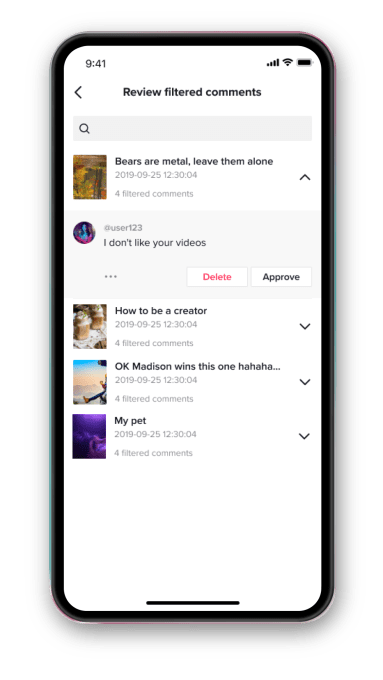
Image Credits: TikTok
Pakistan again bans TikTok over “immoral and objectionable” videos. The app, which has around 33 million users in the country, was blocked by the Pakistan Telecom Authority after Peshawar High Court’s Chief Justice Qaiser Rashid Khan said some TikTok videos were “unacceptable for Pakistani society,” and were “peddling vulgarity.”
A new app called Limit App is offering an Instagram-like service but only for those ages 18 to 25. Reviewed by Geekwire, the app’s creator said it’s not about ageism, but rather about giving young people a place to be themselves. The app uses a secure ID and age verification process to onboard users and, when they turn 26, they’re giving 30 days to download their content before being booted out. Begone, boomers.
Pinterest saw over 193M downloads worldwide in 2020, according to App Annie — a 50% YoY increase, driven by consumers using the platform for product discovery, design ideas, and shopping.
Instagram can now automatically add captions to Stories for better accessibility. Captions are already a commonly used feature on Instagram rival, TikTok, not only for accessibility but also because many people now prefer to have captions on when watching video content.
Facebook tests a feature in India that will share Instagram Reels on the Facebook News Feed. The move is an indication of how seriously Facebook is taking the TikTok threat — it’s now leveraging not just one, but two of the world’s largest social networks to fight back.
TikTok in the U.K. launched a new “music hub” that highlights trending artists and tracks. The company has already been driving music streams and sales through the social app, and the hub will now offer a dedicated section to keep up with what’s currently trending.
Twitter’s head of consumer product, Kayvon Beykpour, defended Apple’s App Store commission rates in recent interview. The exec said the commission isn’t a “highway tax,” but reflects the cost and effort that goes into accepting online payments, including issues with fraud and risk, and the customer service flow around refunds.
India’s government threatened to jail Facebook, WhatsApp and Twitter employees if they don’t comply with data and takedown requests related to the protests by Indian farmers over agricultural law changes.
Photos
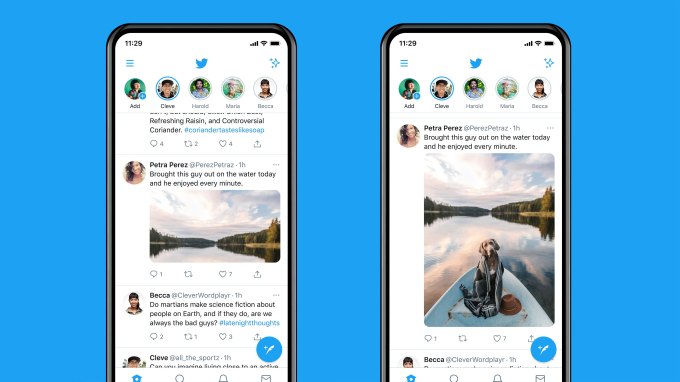
Image Credits: Twitter
Twitter began a test to make photos look better on its platform. The company is trying out a new way to display images which offer sa more accurate preview of what the photo looks like, instead of automatically cropping the image as before. The change, in part, is also meant to address issues around the baked-in racial bias in Twitter’s algorithm that decided which part of the image to focus on when cropping.
Messaging and Communications
Google will link Android phones with Chromebooks through a new Phone Hub feature, allowing Chrome OS users to respond to texts, check their battery life, enable a Wi-Fi hotspot and locate a misplaced device, among other things.
Dating Apps
 Bumble launched “Night In,” a new feature in the U.S. and Canada that lets online daters play games together from the app. At launch, users can play trivia games but the company says it plans more virtual experiences in the future. The timing of the launch is interesting — it comes a year into the pandemic which has forced people to stay home and social distance. But as “Night In” arrives, vaccinations are ramping up and, likely, so will real-world, in-person dating. That Bumble still invested in virtual dating experiences indicates the company sees the feature as something with longer-term potential, rather than a temporary stand-in for that first drink or coffee date.
Bumble launched “Night In,” a new feature in the U.S. and Canada that lets online daters play games together from the app. At launch, users can play trivia games but the company says it plans more virtual experiences in the future. The timing of the launch is interesting — it comes a year into the pandemic which has forced people to stay home and social distance. But as “Night In” arrives, vaccinations are ramping up and, likely, so will real-world, in-person dating. That Bumble still invested in virtual dating experiences indicates the company sees the feature as something with longer-term potential, rather than a temporary stand-in for that first drink or coffee date.
Bumble also filed its first quarterly report since its Feb. 2021 IPO, topping Wall St. estimates with $165.6 million in revenue and 2.7 million paid users (up 32.5% YoY) in the fourth quarter.
Streaming & Entertainment
Amazon adds a merch store to its streaming music app. The company’s Amazon Music app is now offering in-app product sales from Billie Eilish, Selena Gomez, and other artists via a Merchbar integration. (Just wait until it actually remembers it has a whole retail website it could connect.)
YES Network debuts an app that will live stream New York Yankees, Brooklyn Nets, NYFC, and New York Liberty games via a TV Everywhere integration. This is the first live streaming app from the network. Sure, we need another one.
Apple Podcasts is replacing the “subscribe” button with a “follow” button for keeping up with favorite podcasts. The change, first reported by Podnews, came about because people increasingly think of subscribe as referring to a paid option. I’m sure they didn’t get that idea from…THE APP STORE.
Spotify this week updated its app with support for 36 new languages, as promised during last month’s “Stream On” event, including: Afrikaans, Amharic, Azerbaijani, Bengali, Bhojpuri, Bulgarian, Simplified Chinese, Croatian, Danish, Estonian, Filipino, Gujarati, Hindi, Icelandic, Kannada, Latvian, Lithuanian, Malayalam, Marathi, Nepali, Norwegian, Odia, Persian, Portuguese for Portugal, Eastern Punjabi, Western Punjabi, Romanian, Serbian, Slovak, Slovenian, Swahili, Tamil, Telugu, Ukrainian, Urdu, and Zulu. The app is now available in 62 languages in total, and is expanding to over 80 global markets.
New streaming service Paramount+ saw its app downloaded 277K+ times in the first 5 days, reports Apptopia. The app launched similarly to how HBO Max did — it took an existing app and transitioned it to a new one. In its case, the CBS All Access app transitioned to Paramount+. This impacts the number of early downloads, as many users are just upgraded. Thanks to a pre-launch sale, the app also saw $86.7K in IAP revenue on March 2, the highest single-day revenue to date.
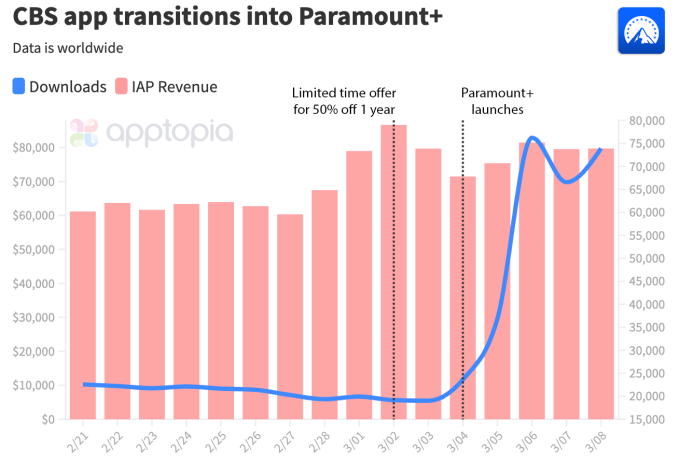
Image Credits: Apptopia
Gaming
 Epic Games takes its app store legal fight to Australia with a new anti-competitive claim against Google, over the 30% commissions on in-app purchases. The company is fighting Apple and Google in many markets now, including the U.S., E.U., and U.K.
Epic Games takes its app store legal fight to Australia with a new anti-competitive claim against Google, over the 30% commissions on in-app purchases. The company is fighting Apple and Google in many markets now, including the U.S., E.U., and U.K.
The average size of the U.S. App Store’s top games has grown 76% in the past 5 years, says Sensor Tower. The average game file size in 2016 was approximately 264 megabytes across the top 100 revenue generating games on the U.S. App Store. This has grown to 465 MB in 2020. Top games driving the file size growth include DoubleDown, Fortnite, Clash of Clans, Roblox and Homescapes.
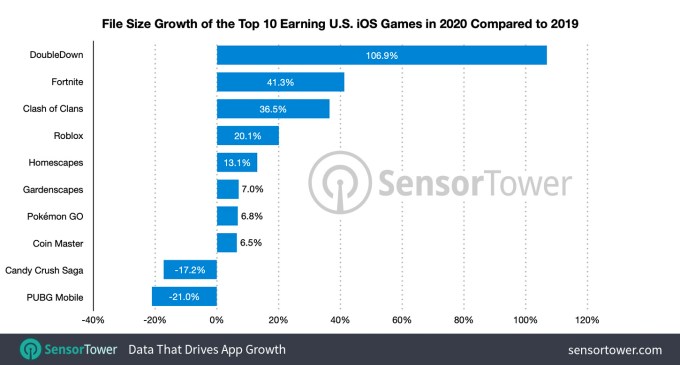
Image Credits: Sensor Tower
Food & Drink
Data from App Annie indicates app sessions in food and drink apps grew 105% YoY in 2020, as the pandemic led to a surge of adoption for food delivery apps. Deliveroo in particular had a standout year in 2020, as the No. 2 “breakout” food & drink app in France and No. 3 in the U.K. — a metric App Annie uses to track growth in total sessions. App sessions grew from their lowest point of 1.81 billion on March 22, 2020 to 3.02 billion by the end of Dec. 2020, the firm said.
Digital Passes
 Disney is bringing the service that powers its existing MagicBands to Apple devices with the launch of Disney MagicMobile. The service, which will launch in phases starting later this year, will allow guests to create a mobile pass using the My Disney Experience app, then add it to their smart device’s digital wallet. Users can then hold up their smart device, including their Apple iPhone or Watch, to check into rides at the access points.
Disney is bringing the service that powers its existing MagicBands to Apple devices with the launch of Disney MagicMobile. The service, which will launch in phases starting later this year, will allow guests to create a mobile pass using the My Disney Experience app, then add it to their smart device’s digital wallet. Users can then hold up their smart device, including their Apple iPhone or Watch, to check into rides at the access points.
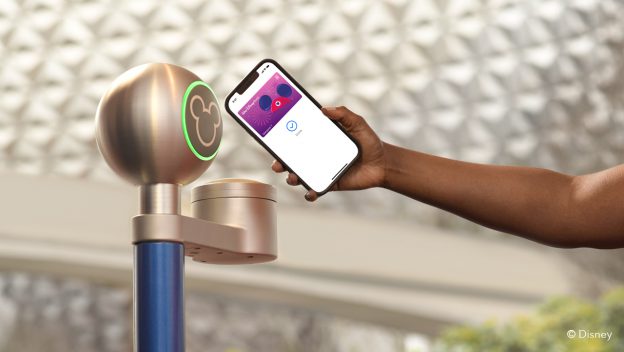
Image Credits: Disney
This doesn’t necessarily mean the end for MagicBands, though. The bands still make sense for kids without devices or for anyone who doesn’t want to worry about pulling out their phone for every ride (or who doesn’t own an Apple Watch). Plus, some Disney fans like collecting MagicBands in new styles. Disney said it will soon release a new set with favorite characters.
Fintech
India’s Paytm will turn Android phones into POS terminals by introducing a card acceptance feature in the NFC-enabled Paytm Business app. Once activated, merchants will be able to process transactions by tapping a payment card to their smartphone.
The new Google Pay app exited beta this week, to replace the older version that will close down on April 5 in the U.S. The updated version include NFC tap-to-pay functionality and p2p payments, but an Ars Technica review slams the app as being less convenient and laden with more fees, among other things.
Chinese beauty app Meitu bought $40 million worth of cryptocurrency, including 15,000 units of Ether and 379.1214267 units of Bitcoin — worth around $22.1 million and $17.9 million, respectively. Meitu chairman Cai Wensheng has been bullish on cryptocurrency and believes in diversifying beyond holding just cash.
Security & Privacy
Apple must face a consumer lawsuit over FaceTime and iMessage privacy in court, not through private arbitration. The case, Ohanian v Apple Inc. focuses on an iOS bug coupled with T-Mobile’s approach to recycling phone numbers that gave third-parties access to users’ communications, despite Apple’s marketing of iMessage and FaceTime as secure features.
Apple is also now facing a privacy complaint in Europe from startup lobby group, France Digitale. The complaint focuses on the IDFA changes, which will required third-party apps to have to ask to track users, while Apple’s own apps are able to track user activity and run personalized ads by default without a similar opt-in pop-up, giving it an unfair advantage.
Funding and M&A
 Social networking app Wefarm, aimed at independent farmers in Africa, raised $11 million in an extension of its 2019 Series A led by Octopus Ventures. The London-based company now has 2.5 million users and has hosted over 37 million conversations via SMS.
Social networking app Wefarm, aimed at independent farmers in Africa, raised $11 million in an extension of its 2019 Series A led by Octopus Ventures. The London-based company now has 2.5 million users and has hosted over 37 million conversations via SMS.
 Gaming platform Roblox made its stock market debut on Wednesday under the ticker symbol RBLX. The stock closed the day at $69.50 per share, giving the business a market cap of $38.26 billion. The cross-platform gaming service works across a range of devices, including mobile.
Gaming platform Roblox made its stock market debut on Wednesday under the ticker symbol RBLX. The stock closed the day at $69.50 per share, giving the business a market cap of $38.26 billion. The cross-platform gaming service works across a range of devices, including mobile.
 Chatbot startup Heyday raised $5.1 million from existing investors Innovobot and Desjardins Capital for its system that lets businesses respond to customers’ messages across apps like Facebook Messenger, WhatsApp, Google Business Messages or even email.
Chatbot startup Heyday raised $5.1 million from existing investors Innovobot and Desjardins Capital for its system that lets businesses respond to customers’ messages across apps like Facebook Messenger, WhatsApp, Google Business Messages or even email.
 Songclip raised $11 million in new funding to bring music to more social media apps. The company is working to popularize the short audio clip media format, and make it accessible across a range of services.
Songclip raised $11 million in new funding to bring music to more social media apps. The company is working to popularize the short audio clip media format, and make it accessible across a range of services.
 Real estate software and data firm VTS acquired Chicago-based Rise Buildings, the makers of a property tech mobile app used in over 130 million sq ft of office space.
Real estate software and data firm VTS acquired Chicago-based Rise Buildings, the makers of a property tech mobile app used in over 130 million sq ft of office space.
 Japan’s SoftBank Group announced this week it will invest $4.7 billion into Tokyo-based messaging app Line, owned by Naver. The investment aims to help develop Line into a “super app,” similar to China’s WeChat, by integrating online news and entertainment from Yahoo Japan (which it owns) as well as financial services from SoftBanks’s mobile payments app PayPay, and more.
Japan’s SoftBank Group announced this week it will invest $4.7 billion into Tokyo-based messaging app Line, owned by Naver. The investment aims to help develop Line into a “super app,” similar to China’s WeChat, by integrating online news and entertainment from Yahoo Japan (which it owns) as well as financial services from SoftBanks’s mobile payments app PayPay, and more.
 Mobile payments service PayPal to acquire cryptocurrency security startup Curv in a deal valued at less than $200 million. PayPal has recently partnered with Paxos to allow U.S. users to buy, hold and sell cryptocurrencies in its app.
Mobile payments service PayPal to acquire cryptocurrency security startup Curv in a deal valued at less than $200 million. PayPal has recently partnered with Paxos to allow U.S. users to buy, hold and sell cryptocurrencies in its app.
 TikTok competitor Triller bought livestream music competition Verzuz, created by Timbaland and Swizz Beatz. To date, the competition has hosted 43 artists including RZA, Nelly, Ludacris, 2 Chainz, DMX, and Gucci Mane. The program will continue to air on IG Live in addition to now, Triller.
TikTok competitor Triller bought livestream music competition Verzuz, created by Timbaland and Swizz Beatz. To date, the competition has hosted 43 artists including RZA, Nelly, Ludacris, 2 Chainz, DMX, and Gucci Mane. The program will continue to air on IG Live in addition to now, Triller.
 Detail raised $2 million in pre-seed funding led by Connect Ventures for its app that that will turn your iPhone into a software-optimized camera for live video.
Detail raised $2 million in pre-seed funding led by Connect Ventures for its app that that will turn your iPhone into a software-optimized camera for live video.
 Krafton, the developer of PUBG Mobile, invested $22.4 million into the Indian esports firm Nodwin Gaming, a subsidiary of gaming giant Nazara and one of the largest esports firms in India.
Krafton, the developer of PUBG Mobile, invested $22.4 million into the Indian esports firm Nodwin Gaming, a subsidiary of gaming giant Nazara and one of the largest esports firms in India.
 Eco, a startup building a personal finance app for saving and spending money, raised $26 million led by a16z Crypto. Uber co-founder Garrett Camp came up with the idea and now advises Eco as a board member. His startup studio, Expa, is also an investor, Fortune reported.
Eco, a startup building a personal finance app for saving and spending money, raised $26 million led by a16z Crypto. Uber co-founder Garrett Camp came up with the idea and now advises Eco as a board member. His startup studio, Expa, is also an investor, Fortune reported.
Runway gets YC backing for its service aimed at streamlining mobile app releases. The app was built by the first iOS team for Rent the Runway, and focuses on automating many common pain points that can stop an app release’s progress.
Downloads
Fer.al

Image Credits: WildWorks
A new game, Fer.al, has entered the market to compete for Gen Z’s time and attention which is currently spent in virtual worlds like Roblox, Minecraft and Fortnite. The game was developed by WildWorks, the makers of what’s often kids’ first virtual world game, Animal Jam. It also continues the animal-as-avatar metaphor, but this time with fantasy creatures you customize yourself, and a storyline about a animal-themed reality show, dueling queens, factions, and adventures. The game is available across platforms including Mac, PC, iOS and Android.
Wombo
Last week, “deep nostalgia” was going viral as people animated their long-lost relatives or even closer family members using apps like MyHeritage or TokkingHeads. But this week, everyone’s trying out Wombo — an AI-powered deepfake app that can animate any face to lip sync to songs like “Thriller” or “I Will Survive,” as well as many meme songs, like “Never Gonna Give You Up” or “Numa Numa.” The results are…ugh, cringe. But the attention sent a surge of downloads to the app, moving it up to (as of the time of writing) No. 30 Overall on the App Store. Since its Feb. 2020 launch, the app has been downloaded 2M+ times across iOS and Android.
from TechCrunch https://ift.tt/3cujIiM









0 comments:
Post a Comment